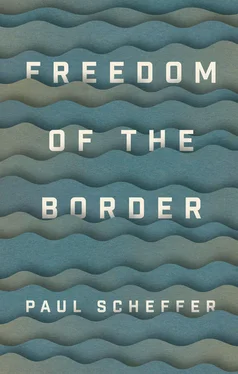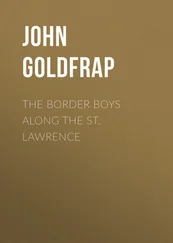According to French philosopher Régis Debray, we are witnessing a return of the repressed. 9In a time when many people embraced the notion of a post-national world, territorial issues returned in full force. One early indication of this was the outbreak of a cruel civil war in Yugoslavia, which created new states and therefore new borders. Everyone is happy to stand and sing ‘We Are the World’, yet there are now four times as many member states of the United Nations as there were when it was formed, as Debray points out.
The world does indeed have more national borders than ever, over a quarter of a million kilometres of them, and this in itself tells a story of political fragmentation. 10They have increased by more than 25,000 kilometres in Europe alone since 1990, largely because of the breakup of Yugoslavia, Czechoslovakia and the Soviet Union. Over half the borders of present-day Russia are new. 11
Debray believes we must learn to draw a distinction between borders and walls. 12Walls are intended to block human traffic, whereas borders are intended to regulate it. In the public mind the two are frequently confused, because nowadays the concept of a border immediately evokes the image of a fence or a wall. The recognition of borders is in fact the best remedy for the epidemic of walls, Debray argues. In his view, the fences going up all over Europe are a result of the lack of an external border.
Respect for borders makes possible the peaceful resolution of conflict. This is not to say that borders are fixed once and for all, but conflict is never far away when they are disputed. We need only think of the Oder–Neisse line, which Germany was required to recognize as a condition of its unification. The fixing of its Eastern border contributed to the embedding of the new Germany in Europe. Or look at the Israel–Palestine conflict. There too, the recognition of a border between two states is essential for a lasting peace that may make it possible in the future to reach across the border once again.
The best example is presented by the Helsinki accords of 1975, which determined the borders in Europe and so enabled the start of a relaxation of tensions between East and West. Precisely because countries relinquished claims to the territories of other countries, it proved possible to increase the space for human rights in the East. There is a direct connection between the Helsinki accords and the fall of the Berlin Wall fourteen years later. Those who recognize that mutual respect for borders helps to preserve peace will be freed to some extent from liberal embarrassment about borders.
In 2005, dissident turned president Václav Havel said that the stabilization of the borders of the new Russia would be a major contribution to new relationships in Europe. The ‘grey zone’ of countries between the European Union and the Russian Federation in particular necessitates unambiguous agreements. ‘Russia does not really know where it begins and where it ends’, Havel said. 13He also said that the recognition of borders contributes to peaceful and productive relationships in a part of Europe that has continually seen borders move or disappear. There is currently no prospect of such recognition; in Ukraine and Georgia, and in Crimea, we have seen violence in recent years.
How different were expectations after the fall of the Wall. In the years after the end of the Cold War, massive cuts were made to everything that had helped to guarantee territorial integrity. Many thought that defence need no longer be a priority. The guarding of borders seemed unnecessary in the years in which a post-national world, a postmodern world if you like, seemed to announce itself.
There was an expectation that after 1989 democracy would increasingly become a generally accepted norm. The reality turned out very differently and the ideal of an open society has not been accepted everywhere by any means. After years in which democracy was on the rise, autocratic regimes in Russia, China, Turkey and elsewhere are gaining ground. In the European Union democracies can open their borders to each other, but in an illiberal world they need to defend their shared outer borders.
Political scientist John Mearsheimer writes that since the collapse of the Soviet Union the behaviour of the great powers has not changed fundamentally. ‘In fact, all of the major states around the globe still care deeply about the balance of power and are destined to compete for power among themselves for the foreseeable future.’ 14The desire to change the balance of power in their own favour still determines the behaviour of the world’s major powers. They deeply distrust each other and never exclude the possibility of using violence if circumstances favour it.
Mearsheimer stresses the unstable character of international politics. Great powers strive for dominance of their own regions in order to achieve as much security for themselves as possible. They are rarely status quo powers, since they are continually trying to change the international system in ways that will suit them. Their survival depends upon aggressive behaviour. ‘No amount of cooperation can eliminate the dominating logic of security competition. Genuine peace, or a world in which states do not compete for power, is not likely as long as the state system remains anarchic.’ 15
This supposedly realistic approach is at odds with liberal ways of addressing international politics. According to liberal teachings, inspired by Kant, it makes an important difference whether or not countries are organized democratically. But, Mearsheimer counters, even if we endorse the theory of democratic peace, it remains ‘unlikely that all the great powers in the system will become democratic and stay that way over the long term. It would only take a non-democratic China or Russia to keep power politics in play, and both of those states are likely to be non-democratic for at least part of the twenty-first century’. 16
It’s hard to argue with that assessment. To the East Europe comes up against rising nationalism in Russia and China, to the South escalating civil war in the Arab nations and to the West declining American power. Joschka Fischer, former German foreign minister, had an apt description of the current era. He looked above all at the declining influence of America, which had for decades guaranteed the security of Europe. ‘The chaotic consequences of the gradual disintegration of the Pax Americana are becoming increasingly clear’, he wrote. 17
So slowly the outlines of the new world disorder are becoming visible, and it is increasingly obvious why the current sense of vulnerability is far more than just a feeling. The fact of having many violent conflicts close to home was for many Europeans an abstraction just ten years ago, but now it is thoroughly tangible. Although for a long time – and certainly since the expansion of the European Union – there have been quite a few unstable countries on its outer borders, the disintegration has become visible to Europeans in its full extent only in recent years. The old continent is hedged about by a series of states where disorder takes violent forms. It is increasingly affected by those conflicts on its borders and has not been particularly successful in protecting itself against them.
We must bring the liberal and realist schools of thought about world politics together so that they can hone each other. In today’s world we clearly see both traditional power politics and the quest for lasting peace. The expanded European Union, where conflicts are fought out over the conference table, is the best example of pacification of ancient enmities. Twenty-seven countries are now engaged in efforts to establish ‘eternal peace’, a project without precedent.
The question is, how can the European Union promote this culture outside its own borders? Are the compromises laboriously arrived at daily in the corridors of Brussels a match for the brutality of international politics beyond its periphery? While geopolitics in relationships within the Union has largely been tamed, the confrontation between countries of the Union and the rest of the world is as much a matter of power politics as ever.
Читать дальше












